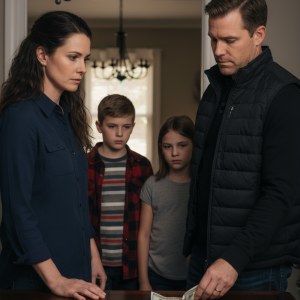The chapel was hushed under pale flowers and candle glow, grief pooling in every corner. Rows of guests in charcoal and black stared toward the open, satin-lined casket. Inside lay Daniel Walker—34, a husband, a dad, the friend who could light up any room—gone, everyone thought, after a sudden car crash.
No one had quite accepted it. Only days earlier, Daniel had been planning his daughter’s third birthday—balloons, a cake, a silly playlist. Now the unthinkable.
Emma stood at the front, shoulders drawn tight, one hand gripping the small fingers of their daughter, Lily. The child’s black dress looked borrowed from a world that shouldn’t touch her yet. She hadn’t spoken since the day Emma told her Daddy wasn’t coming home.
When the priest offered the final blessing, Emma knelt so Lily could hear her. “Do you want to say goodbye to Daddy, sweetheart?”
Lily nodded. A family friend lifted her carefully so she could see. She studied Daniel’s face—so still, so quiet. “Daddy’s just sleeping,” she whispered.
A few guests dabbed at their eyes. Children confuse sleep and death, they told themselves. But Lily’s voice returned, firmer now, tremoring with urgency. “Daddy, wake up! Please! You’re just sleeping! Open your eyes!”
Lily reached in and touched his cheek. “He’s cold,” she breathed, then turned wide-eyed to Emma. “Mommy, he’s scared. He said, ‘I’m here. Please help.’ He’s inside.”
A ripple went through the room. The priest faltered; murmurs rose.
From the back, Daniel’s cousin Jacob stood. “Check his pulse,” he said—steady, insistent.
The funeral director hesitated. “I—I assure you, the body was—”
“Please,” Emma said, the word catching. “Please just check.”
He laid two fingers at Daniel’s wrist. Nothing. Then his hand shifted to the neck. His face changed. “I think… I think he has a pulse.”
The room erupted—gasps, a cry, the scrape of shoes on tile. “Call an ambulance! Now!”
EMTs rushed in within minutes. They confirmed the faint, slow beat. Daniel was lifted from the casket to a stretcher, oxygen mask in place, vitals monitored. A paramedic looked up at Emma. “He’s in extreme physiological shutdown—dangerously low signs, but alive.”
Emma blinked through shock. “But… they told us…”
“I know,” the paramedic said gently. “Your daughter may have just saved his life.”
At the hospital, Daniel was admitted to the ICU. For days he hovered, body stuck between here and somewhere unreachable. Doctors explained a rare trauma response: a profound shutdown that mimics death—vitals too faint for standard checks. The mortician had signed off in good faith.
No one questioned it—except a toddler who wouldn’t let go of what she knew.
A week later, Daniel’s eyes fluttered open. Emma was there, Lily tucked under her arm. Tears tracked down Emma’s face. “You’re back,” she whispered.
Daniel swallowed. “I was… trapped. I could hear you. I couldn’t move.”
“You heard us?”
“I heard Lily. ‘Daddy, wake up.’ I tried. I was so scared.”
Lily peeked up. “I told them you were still here.”
“You saved me,” Daniel said, eyes wet.
The story spread—first through the town, then far wider. News crews came. Specialists debated terms: “death-mimic state,” “trauma-induced catatonia,” exotic acronyms. Emma smiled through the jargon. She had her own definition for what happened.
Months passed. Daniel regained strength, step by careful step. He made it home in time for Lily’s third birthday—now a celebration of near-misses and second chances.
Friends who once gathered to mourn returned with gifts and relief. The same community hall that had held sorrow now echoed with children’s laughter. On a small table, a framed photo: Daniel holding Lily, both smiling wide.
Beside it, a simple placard: Sometimes the smallest voice carries the biggest truth.
Underneath, in shaky crayon: Daddy wasn’t gone. He was just sleeping.





